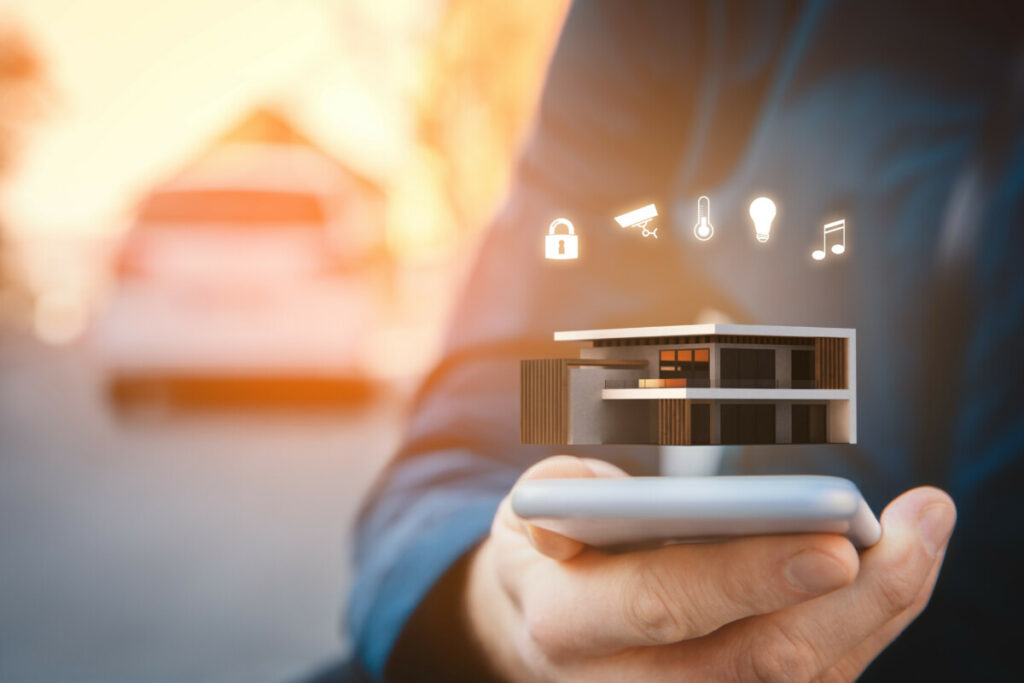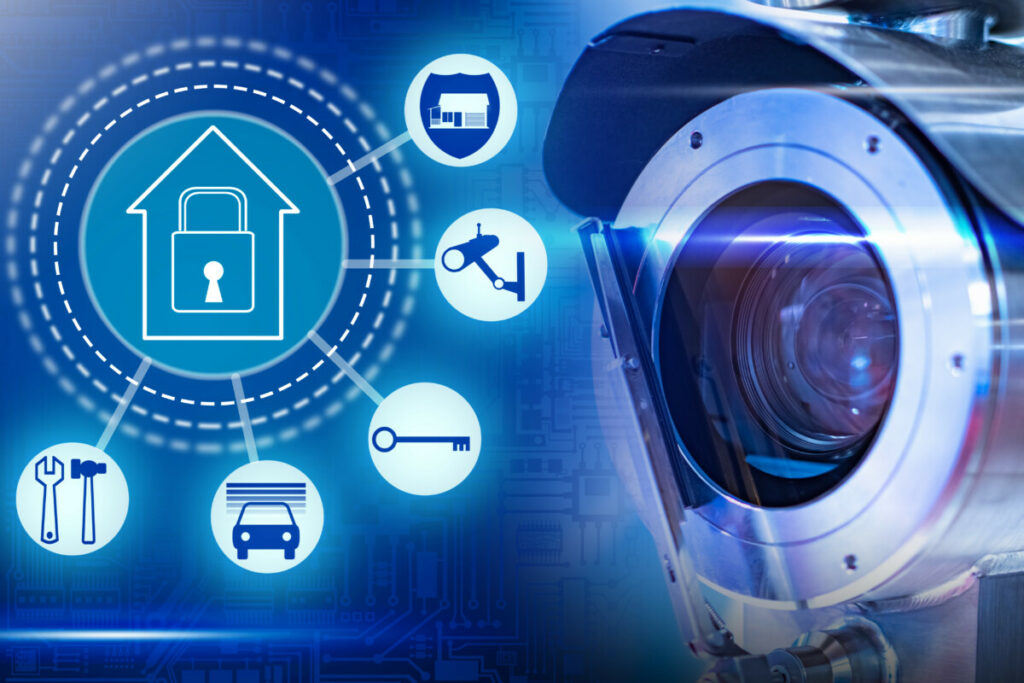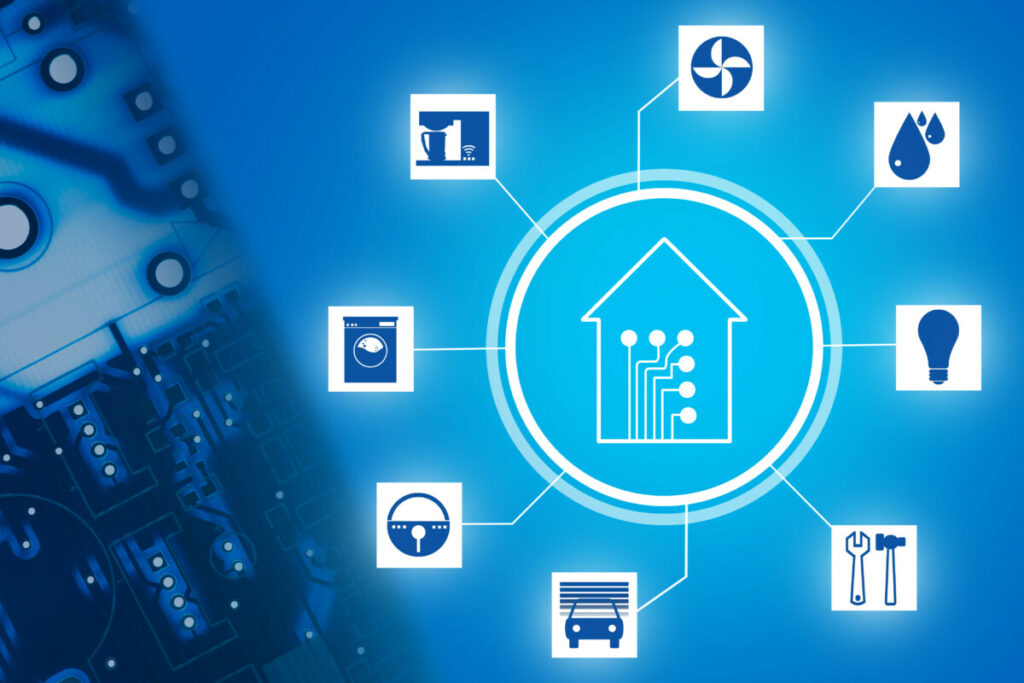- Making the Most of Your Smart Home: Common Use Cases - March 28, 2023
- Eco Mode at Night: Maximizing Nest’s Energy Savings - March 20, 2023
- Connecting & Controlling Smart Home Devices: A Guide - March 18, 2023
Disclosure: Links marked with * are Affiliate Links. As an Amazon Associate, I earn from qualifying purchases if you decide to make a purchase through these links – at no cost for you!

Smart homes are becoming more and more popular every day, and some people wonder if smart homes or traditional homes are better. However, we first need to determine what the differences between a smart and traditional home are.
Smart homes are better because they offer energy-efficient ways to control home devices in one place and increase safety. Traditional homes do not have the same abilities but decrease the chances of power outages and don’t require a change of systems.
Smart homes and traditional homes both have positives and negatives, but as smart homes become more popular, it’s important to know which one has more pros than cons. If you want to know more, keep reading!
Table of Contents
Smart Home Pros
Access to All Devices in One Place At Any Location
One of the best advantages of having a smart home system is that you can access all of your smart devices in one location on your phone, and can then access them wherever you may be. Whether you are on the road, in the office, at the grocery store, at home, or anywhere else, you can access your smart home system. You can lock your doors, shut your garage, turn off speakers, stoves, televisions, and so much more with a smart home system.
Being able to turn off your stove on the way to work because you forgot or lock the doors when your kids are home alone, smart homes have you covered. This is something that traditional homes just cannot do. In a traditional home, if you forgot to turn your stove off, you have to drive back home and turn it off. If you think that you forgot to turn off the stove, you have to go back inside your house a check, which takes time that you may not have if you are running late for work.
Energy Efficient
Another advantage to having a smart home is that smart homes help you become more energy efficient. Because smart homes allow you to access your smart devices with a push of a button, in any location you want, the amount of energy your home is using can be decreased at any time just by turning the energy-using devices down whenever you want.
In the world, more and more energy gets used every day, but with a smart home, you would be preserving and saving energy instead of wasting and spending it. Living energy-efficient lives can feel less stressful because you are using less energy, which results in less money you are spending on said energy. If you want to save time and energy, a smart home is definitely for you!
Home Security and Safety
One of the most important advantages of having a smart home is that a smart home helps increase the safety of your home. Having a safe home is essential for your family’s happiness, and a smart home can help you achieve this.
In the past, the safety of homes was based on trust in those around us and the locking of the doors and windows in the homes. As the number of crimes committed every year has increased, the fear of residents has increased. These horrible occurrences can be combated and decreased by the use of a security system in a smart home.
With a smart home, you can lock your doors wherever you are, access your doorbell and cameras at any location, and can call the police with a push of a button. This makes safety easy, accessible, and trustworthy. If your kids are home alone and they forget to lock the doors, there is no need to call them or go home, as you can lock the doors from anywhere. For this reason, smart homes are super important in our constantly changing world.
Smart Home Cons

Smart homes are great, that is true. However, there are a lot of factors about a smart home that might change your mind about getting one. Make sure to consider all of the pros and cons of smart and traditional homes before choosing your final option!
Learning Curve
Something that comes along with having a smart home and using its devices is the learning curve. If you are used to having a traditional style home, using the devices of a smart home can be a bit tricky to understand and learn. You may make mistakes, it may take a long time to get used to it, and you may regret it at first. This learning curve can be scary and daunting, which makes it a definite factor that you should be considering.
Hacking Possibilities
Phones and computers are constantly getting hacked, especially as more and more technology becomes popular and hackers become more advanced. Unfortunately, just like those phones and computers, smart homes can also be hacked. The hacking of smart homes is a little more intense than the hacking of phones or computers. Personal information can get leaked, cameras and doorbells can get hacked, and the locking of doors can be taken over. With the hacking of smart devices comes a decrease in safety and security within your home.
This is a factor that makes traditional homes look a little bit better. With the traditional locking of the door, it cannot get hacked, and safety violations won’t happen because of hacking. This is a huge disadvantage of smart homes and definitely makes traditional homes seem a lot safer.
Expensive
As more and more technology becomes popular, the prices of that technology also increase. Smart devices are not typically cheap, which is a big disadvantage of having a smart home. It can cost thousands of dollars to make your home smart, and as the popularity of smart homes goes up, the prices of the devices that a smart home can control will also go up. This means that you will constantly be spending more and more money on your smart home. When comparing this to a traditional home, smart devices are seen as too expensive and not worth the cost depending on the individual using the system.
Can Cause Power Outages
There is a very annoying and possibly dangerous factor to smart homes that not everyone thinks about. This factor is power outages. If there is a power outage that affects your home, or if your controls of the smart devices stop working, a lot of the access and use of these smart devices may shut down and no longer work properly.
If there is a power outage, your safety may also be compromised by the smart home shutting down and maybe unlocking your doors or allowing your smart home system to become vulnerable to hackers.
This is a factor of the smart home that can’t be fixed with the push of a button. Your power has to get turned back on, and your smart home has to be up and running for your house to get back to normal. This may be a disadvantage that’s too annoying for you, and if so, don’t get a smart home.
Traditional Home Pros

Traditional homes may seem boring and old-fashioned, but there are a lot of positive benefits to a traditional home that smart homes just cannot offer. Here are some of those benefits!
Simple and Familiar
One of the best arguments as to why traditional homes are considered better than smart homes is that traditional homes do not require you to learn how to use a new system. It’s simple, it’s easier than easy, and it’s familiar. With a smart home, your world can get turned upside down just because you have to learn all the new ways to control household devices. This makes traditional homes look a heck of a lot better than smart homes.
Can be Safer
Smart homes and traditional homes can both be seen as safe and unsafe. It all really depends on what you think. However, we are here to tell you what traditional homes offer in safety that smart homes do not.
With smart homes, systems can be hacked, devices can be taken over, and lives can be changed in just a few short moments. I recently watched a movie about a girl who had a smart home-like system, and her system got hacked, which allowed an intruder to come into her home. Just like the girl in this movie, safety can be changed drastically because of a smart home system.
With traditional homes, you trust the good old-fashioned locking of doors and deadbolts to keep you safe and happy. For some people, that old-fashioned way of doing it is the best option for them. For this reason, smart homes have some huge disadvantages that traditional homes do not.
Cheaper
As we mentioned above, smart homes can be incredibly expensive to purchase and use consistently. With this in mind, we come to the fact that traditional homes are just not as expensive as a home that is using the smart home system.
When using smart home devices, you have to buy your house, get all of the smart devices, get them all working and placed in your home, and then pay for any upkeep or upgrades that come out. With the traditional home, all you have to do is buy your home. There is no extra charge because you aren’t using a smart home system.
This leads to saving time, money, and energy, and decreasing a lot of everyday stress that comes from spending money. You may want to consider sticking with a traditional home if you do not want to spend money on a smart home.
Traditional Home Cons
Not as Safe
As we have said above, traditional homes can possibly be safer than smart homes. There is also a wide variety of people who have the opinion that traditional homes are not as safe as smart homes, and we are here to tell you why that is.
Smart homes offer safety precautions and additions that the traditional home does not. In traditional homes, you have to trust the locking of doors to keep intruders out of your home and away from your family. With a smart home, you get the additional comfort and safety that comes from the ability to lock your windows and doors from anywhere in the world. You also can contact the police and monitor your home’s security system at the touch of a button.
Because of these additional factors that smart homes offer, traditional homes just may not be quite as safe as smart homes. In the movie that I discussed above, even though her system got hacked, she was able to keep the intruder out for longer than usual and was able to call the police from the system. So, even though smart homes have their safety disadvantages, they have their advantages too.
Which type of home is better really just comes down to what your opinions and preferences are.
“Old Fashioned”
It is a known fact that as more and more technology comes into the world, more and more individuals believe that the use of smart homes is “trendy” and that not having one is seen as “old-fashioned.” Smart devices and systems are being purchased and utilized every single day, but there are a lot of people who have not yet jumped on that bandwagon. If you decide to stick with the traditional home and not have a smart home, you may be seen as old-fashioned and not “with the times.”
If you are not used to the technology and systems that are used in smart homes, the traditional home may be perfect for you. However, if you typically follow the latest trends and do not like to be seen as old-fashioned, then staying with the traditional style home may not fit into your lifestyle.
A smart home has its advantages and disadvantages of course, but it is definitely very modern, trendy, and popular. Look into your life and at the pros and cons of each type of home and choose the option that best suits you and your needs!
Attention: When installing electronic equipment, please be sure to observe the manufacturer’s safety instructions. You have to take care of your own safety. The information on this site only helps you to learn.
Disclosure: This website is the property of Martin Lütkemeyer and is operated by Martin Lütkemeyer. Martin Lütkemeyer is a member of the Amazon Services LLC Affiliate Program, an affiliate advertising program designed to enable Web sites to earn advertising revenue through advertising and linking to Amazon.com. Links marked with * are affiliate links.
